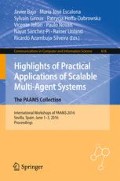Abstract
Supply chain problems cover several aspects at different levels and areas. There are decision on production allocation, resource allocation, production and inventory quantities, distributor selection, choice of transportation mode etc. There are many constraints in the supply chain problems. They concern the following areas (production, distribution, transport, etc.) and types (linear, non-linear, integer, logical, etc.). Therefore it is important effective modeling and solving constraints.
We consider a multi-level and multi-agent approach to modeling and solving supply chain problems using constraint and mathematical programming environments. Its efficiency results from the multi-level presolving and multi-agent architecture. An illustrative example presents effectiveness of the proposed approach. The presented approach will be compared with classical mathematical programming on the same data sets.
Access this chapter
Tax calculation will be finalised at checkout
Purchases are for personal use only
References
Schrijver, A.: Theory of Linear and Integer Programming. Wiley, New York (1998). ISBN 0-471-98232-6
Barbati, M., Bruno, G., Genovese, A.: Applications of agent-based models for optimization problems in a literature review. Expert Syst. Appl. 39, 6020–6028 (2012)
Tsang, E.: Foundation of Constraint Satisfaction. Academic Press, London and San Diego (1993)
Benhamou, F., Jussien, N., O’Sullivan, B.A.: Trends in Constraint Programming. Wiley, New York (2007). ISBN 978-1-905209-97-Wiley-ISTE
Rossi, F., Van Beek, P., Walsh, T.: Handbook of Constraint Programming. Foundations of Artificial Intelligence. Elsevier Science Inc., New York (2006)
Apt, K., Wallace, M.: Constraint Logic Programming Using Eclipse. Cambridge University Press, Cambridge (2006)
Bocewicz, G., Banaszak, Z.: Declarative approach to cyclic steady states space refinement: periodic processes scheduling. Int. J. Adv. Manuf. Technol. 67(1–4), 137–155 (2013)
Bzdyra, K., Banaszak, Z., Bocewicz, G.: Multiple project portfolio scheduling subject to mass customized service. In: Szewczyk, R., Zieliński, C., Kaliczyńska, M. (eds.) Progress in Automation, Robotics and Measuring Techniques. AISC, vol. 350, pp. 11–22. Springer, Heidelberg (2015)
Bockmayr, A., Kasper, T.: Branch-and-Infer: a framework for combining CP and IP. In: Milano, M. (ed.) Constraint and Integer Programming. Operations Research/Computer Science Interfaces Series, pp. 59–87. Springer US, New York (2004). doi:10.1007/978-1-4419-8917-8_3
Achterberg, T., Berthold, T., Koch, T., Wolter, K.: Constraint integer programming: a new approach to integrate CP and MIP. In: Trick, M.A. (ed.) CPAIOR 2008. LNCS, vol. 5015, pp. 6–20. Springer, Heidelberg (2008)
Bistarelli, S., Montanari, U., Rossi, F.: Semiring-based constraint satisfaction and optimization. J. ACM 44(2), 201–236 (1997). doi:10.1145/256303.256306
Hooker, J.N.: Logic optimization, and constraint programming. J. Comput. 14(4), 295–321 (2002)
Milano, M., Wallace, M.: Integrating operation research in constraint programming. Ann. Oper. Res. 175(1), 37–76 (2010). doi:10.1007/s10479-009-0654-9
Jain, V., Grossmann, I.E.: Algorithms for hybrid MILP/CP models for a class of optimization problems. INFORMS J. Comput. 13(4), 258–276 (2001)
Sitek P., Wikarek J.: A hybrid method for modeling and solving constrained search problems. In: Proceedings of 2013 Federated Conference on Computer Science and Information Systems, FedCSIS, pp. 385–392 (2013)
Sitek, P., Wikarek, J.: A hybrid framework for the modelling and optimisation of decision problems in sustainable supply chain management. Int. J. Prod. Res. 53(21), 6611–6628 (2015). doi:10.1080/00207543.2015.1005762
Sitek, P., Wikarek, J., Grzybowska, K.: A multi-agent approach to the multi-echelon capacitated vehicle routing problem. In: Corchado, J.M., Bajo, J., Kozlak, J., Pawlewski, P., Molina, J.M., Gaudou, B., Julian, V., Unland, R., Lopes, F., Hallenborg, K., Teodoro, P.G. (eds.) PAAMS 2014. CCIS, vol. 430, pp. 121–132. Springer, Heidelberg (2014)
Sitek P.: A hybrid CP/MP approach to supply chain modelling, optimization and analysis. In: Federated Conference on Computer Science and Information Systems, pp. 1385–1392 (2014)
Eclipse: Eclipse - The Eclipse Foundation open source community website (2015). www.eclipse.org. Accessed 4 May 2015
Lindo Systems INC: LINDO™ Software for Integer Programming, Linear Programming, Nonlinear Programming, Stochastic Programming, Global Optimization (2015). www.lindo.com. Accessed 4 May 2015
Relich, M.: Identifying relationships between eco-innovation and product success. In: Golinska, P., Kawa, A. (eds.) Technology Management for Sustainable Production and Logistics, pp. 173–192. Springer, Heidelberg (2015)
Sudo, Y., Kurihara, M., Mitamura, T.: Extending fuzzy constraint satisfaction problems. J. Adv. Comput. Intell. Intell. Inf. 10(4), 465–471 (2006)
Grzybowska, K.: Selected activity coordination mechanisms in complex systems. In: Bajo, J., Hallenborg, K., Pawlewski, P., Botti, V., Sánchez-Pi, N., Duque Méndez, N.D., Lopes, F., Vicente, J. (eds.) PAAMS 2015 Workshops. CCIS, vol. 524, pp. 69–79. Springer, Heidelberg (2015). doi:10.1007/978-3-319-19033-4_6
Deniziak, R., Bąk, S., Czarnecki, R.: Synthesis of real-time cloud applications for internet of things. Turk. J. Electr. Eng. Comput. Sci. 7719, 35–49 (2013)
Author information
Authors and Affiliations
Corresponding author
Editor information
Editors and Affiliations
Rights and permissions
Copyright information
© 2016 Springer International Publishing Switzerland
About this paper
Cite this paper
Wikarek, J., Sitek, P. (2016). A Multi-level and Multi-agent Approach to Modeling and Solving Supply Chain Problems. In: Bajo, J., et al. Highlights of Practical Applications of Scalable Multi-Agent Systems. The PAAMS Collection. PAAMS 2016. Communications in Computer and Information Science, vol 616. Springer, Cham. https://doi.org/10.1007/978-3-319-39387-2_5
Download citation
DOI: https://doi.org/10.1007/978-3-319-39387-2_5
Published:
Publisher Name: Springer, Cham
Print ISBN: 978-3-319-39386-5
Online ISBN: 978-3-319-39387-2
eBook Packages: Computer ScienceComputer Science (R0)

